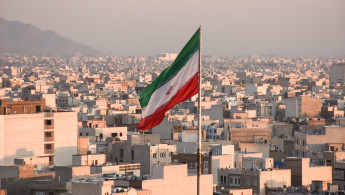Political fallout in Tehran as hardliner mayor's power endures
Despite numerous efforts by rival political groups in Tehran to oust the ultra-conservative mayor, Alireza Zakani, he remains firmly in power. He operates with considerable autonomy and has effectively evaded all attempts at accountability.
Following the presidential election in June, which saw a surge of hardliners from the presidential palace, the Tehran mayor has come under attack from both his conservative allies and his rival reformist politicians.
The fracture within the conservative front has led to a backlash from his former allies, while the reformists seize the opportunity to expand their influence within Iran's corridors of power.
On 7 August, under the headline "Is Tehran municipality an island outside Iran?", the pro-reformist Hammihan daily criticized both Zakani and the Tehran municipality for their lack of accountability and failure to address the demands of citizens and politicians.
Aliasghar Qaemi, a conservative member of Tehran's city council, told the daily that the mayor and his office were unresponsive to their inquiries and investigations.
"Which of the notices from the Tehran City Council has the municipality actually addressed?" Qaemi asked.
"The Tehran Municipality always expects others to cooperate with it, but when it comes to the municipality cooperating with others, nothing substantial ever happens," he added.
A mayor more powerful than ministers
In Iran's political landscape, the Tehran mayor, appointed by the city council, wields power equivalent to that of a minister. This structure grants the mayor significant immunity from accountability, coupled with substantial power and influence.
The role has gained even more significance and become a focal point of contention among political factions, particularly after former president Mahmoud Ahmadinejad leveraged his position as Tehran's mayor to pave his way to the Presidential Palace.
Explaining the importance of this post in Iran’s politics, Iranian analyst Hossein Imani emphasized that the mayor is not elected by direct vote from the residents but is chosen by members of the city council.
"The mayors' power does not stem from the municipality itself but from their connections with other sources of political power," Imani stressed.
"In Iran and Tehran, we don't have an actual mayor. What we have is a city manager. A mayor, elected by the people's vote, holds political power. In contrast, the city manager is appointed by the city council and can be dismissed at their discretion," the analyst explained.
This situation has become more evident with Zakani in power.
His appointment as mayor was tied to the political rewards distributed following Ibrahim Raisi's victory in the 2021 presidential election. Zakani, a candidate in that election, withdrew in favour of Raisi and, after Raisi's victory, was rewarded with the position of mayor of the capital.
Since Zakani's appointment as mayor, he has faced significant criticism, with moderate and reformist politicians deeming him unqualified for the position.
He is an ultra-right-wing Islamist who began his rise to power in Iran by joining the Basij paramilitaries at the start of the Iran-Iraq war. He later became an official member of the Islamic Revolutionary Guard Corps (IRGC).
A staunch advocate of the mandatory Islamic hijab for women and a vocal supporter of hostility towards Western powers, Zakani initially registered as a candidate in the June presidential election. However, he withdrew in support of two other conservative candidates.
This withdrawal did not bring new opportunities for him to elevate his position but, rather, exposed him to criticism from fellow hardliners.
Hardliners vs. hardliners
Although Zakani faced criticism even before the presidential election, a speech by Narjes Soleimani, daughter of the slain commander of Iran's Quds Force Qassem Soleimani, ignited a new and powerful wave of opposition against him.
In her address to the Tehran City Council, Soleimani, also a hardline politician, remarked on Zakani's candidacy, saying, "The city needs a wise and discreet expert, someone who works quietly and without fuss, rather than someone who is constantly in the spotlight, desiring another position."
As hardliners attacked Zakani, a video surfaced on Farsi-language social media featuring a high-ranking municipal employee exposing the sale of municipal posts.
In the video, a municipal manager claimed that Zakani's consultants had requested 400 gold coins and US$450,000 to appoint individuals to key positions within the municipality.
Despite the Tehran Municipality's denial of these allegations, many conservative politicians have called for a thorough investigation into the claims and the appointments made.
Even with these criticisms, revelations, and a citizen petition to remove Zakani from this significant position in Iran's political structure, the mayor of Tehran has managed to retain his office.
Part of Zakani's success was attributed to the support he received from the IRGC, while another factor was the calming of conservative concerns following the election of Masoud Pezeshkian as president.
Although reformist and moderate groups supported Pezeshkian during the campaign, recent appointments and his comments about adhering to the country's supreme leader indicated that he is not strongly opposed to conservatives and fundamentalists. This has helped restore harmony among the conservatives and reduce their internal conflicts.
However, with these internal divisions now exposed, it remains uncertain whether Zakani will be able to retain his position as mayor, especially with new city council members set to be elected next year.




 Follow the Middle East's top stories in English at The New Arab on Google News
Follow the Middle East's top stories in English at The New Arab on Google News


